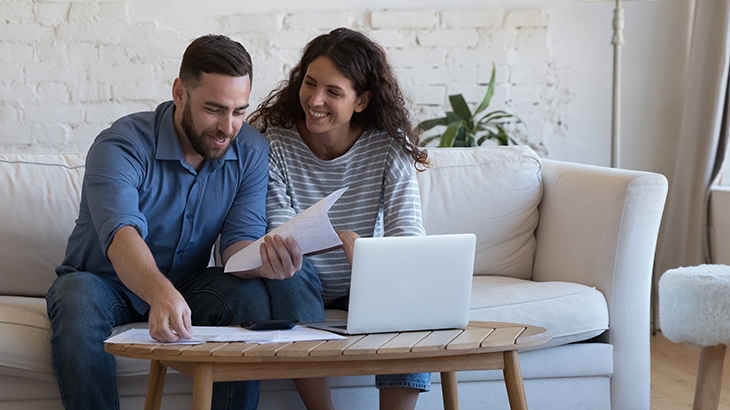What Age Should I Buy a House
Before doing anything else, it's a good idea to do your homework to make sure you're ready to take the plunge. After all, it will probably be the biggest purchase you'll ever make! At the end of the day, regardless of what interest rates look like or how old or young you are, the best time to buy is when you're ready. Read on for a few things to think about and consider (regardless of your age).

Understanding Financial Readiness
To order your free credit report, visit annualcreditreport.com. If you want to improve your credit score (and your chances of approval) before you apply for a home loan, check out our article on How to Boost Your Credit Score. A strong credit score may also help keep your interest rate low on a new loan. Since closing costs can run up to 6% of the cost of the home, it's important that you plan to have enough saved to pay for those costs (you may be able to wrap them in your home loan, but not always) and that you plan to stay in your home for at least a year or two. This way, you have time to recoup those costs and build equity (the difference between what you owe on your home and what your home is currently worth). If you're unsure about including closing costs in your loan, ask a mortgage lender to help you calculate how long it will take you to pay off the closing costs on your loan.
Career Stability and Long-Term Goals
Before purchasing a home, it's important that you feel secure and can maintain your income at its current level (or higher). To qualify for a loan, you'll need to show a lender your employment history and past pay stubs and tax returns for the last two years, along with other paperwork.
Market Conditions
Market conditions are considered good when there's a high inventory of homes, steady prices, and at least relatively low interest rates. There can be a combination of favorable and unfavorable market conditions, but if all three of the main ones are good (and you're ready financially) the time is now! That being said, market conditions aren't everything. If you're ready and can, buy when the time is right for you.
Personal and Family Considerations
Growing families need room, and a yard can be a nice place for the kids to play and the adults to hang out. Think about what you want for your future—do you want kids someday? Will your parents or other relatives be living with you at some point in the future? When buying a home keep the next five to ten years in mind, if you want to stay in the home you buy for a while and find the home that works for both your current and future family. Personally, make a list of your goals and think about how owning a home fits into staying in one place for the foreseeable future.
Benefits of Buying a Home at Various Ages
The benefits of buying in your 20's or 30's can include quite a few things, if you stay in the home:
- Lower housing costs in retirement
- Time to build plenty of equity
- Potential tax incentives for for owning property
- Ability to customize your home for your future
Benefits of buying later in life could include:
- Housing security and stability
- Establish a legacy to leave for your heirs
- Potential tax incentives for owning property
- Generally, you'll have more money for improvements or repairs
- Ability to make changes for accessibility
- More time to save for the down payment and avoid private mortgage insurance
Risks and Pitfalls to Avoid
No matter how old or young you are, there are a few things to keep in mind before you buy a home:
- Keep Your Debt Low: The comparison between your debt and income is called debt-to-income ratio, and helps lenders determine how much home you can afford to buy when applying for a mortgage. The ratio is determined by dividing your monthly debt payments by your gross monthly income (the amount you make before taxes and other deductions). Debt payments can include home loans, car payments, student loans, minimum credit card payments, and other expenses.
- Buy What You Can Afford, Which May Not Be What You Qualify For: After finding out your debt-to-income ratio, make sure you crunch the numbers to see how much you can comfortably spend on your home. Even if you qualify for a certain amount, that does not mean it makes good financial sense to take on that large of a mortgage payment. Some experts recommend that you don't spend more than 28% of your gross income on a mortgage payment. This would mean that you shouldn't spend more than $28,000 a year (or about $2,300 per month) on mortgage payments if you earn $100,000 before taxes annually.
- Establish an Emergency Fund: When it comes to saving, it's generally recommended that you have enough money saved to cover three to six months of living expenses. After making a down payment and paying for closing costs on your home, make sure you still have enough money in your emergency fund, just in case.
- Stay Within Your Budget: Paying for a house involves a lot more than your monthly mortgage payment. You'll want to factor in possible increases in monthly bills like electricity in the winter and water in the summer, and costs for any home repairs, as well as homeowner's insurance, among other costs. To better manage your budget, find an app or create a worksheet to track your typical monthly income sources and expenses (every penny). This will help you see where you can make some cuts and figure out where you can comfortably save. Even $10 a month adds up over time!
- Don't Open New Loans or Credit Cards After Applying: This is big! Never apply for any type of credit after you apply for a home loan. Your lender is required to run your credit just before closing to make sure you can still afford the mortgage. If you want to buy furniture or a car, wait until after you've got the keys in hand. It's best to wait for any major purchases or to start any new projects until you've lived in the home for at least six months so you can get used to your new budget and living in a new space.
WaFd Bank is Here to Help
When it comes to getting your finances in order for the ups and downs of life, a little planning goes a long way. Whether you're a seasoned budgeting pro or new to saving (check out WaFd Bank's account options while you're here), your local WaFd Bank branch is available to help you reach your financial goals. Open an account online, visit your local branch, or give us a call at 800-324-9375 to learn more and open an account today.
Did you find this article helpful? Share it!


